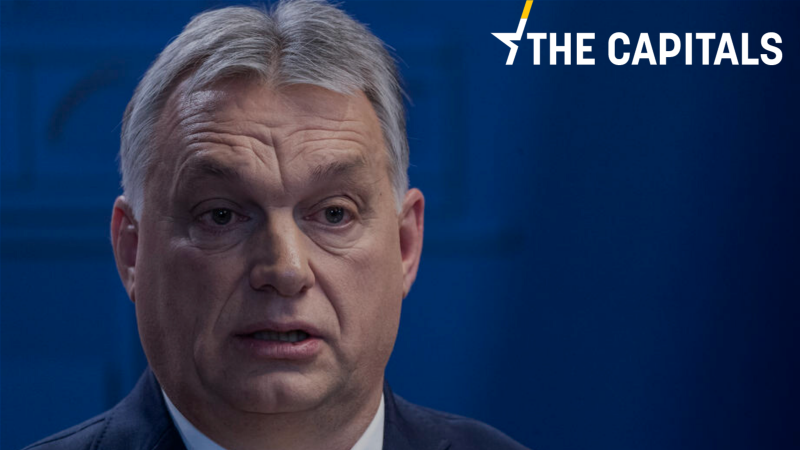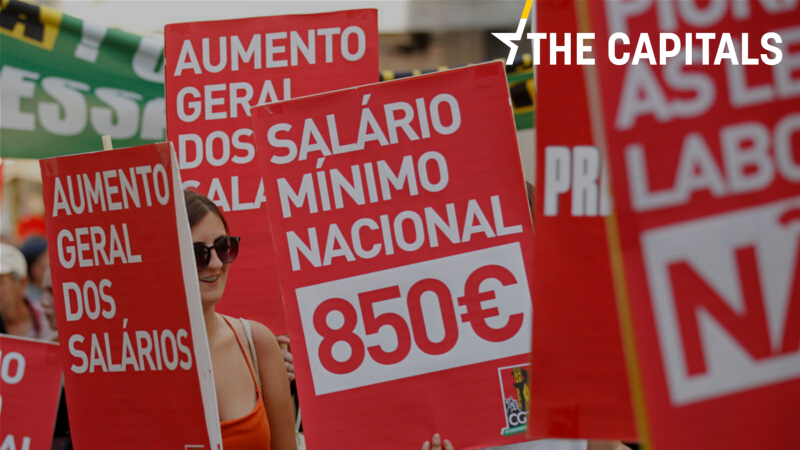
Before you start reading today’s edition of the Capitals, we invite you to read our Brief from yesterday “‘Family’ members should not stab each other” written by EURACTIV’s Network Editor Sarantis Michalopoulos.
Also, feel free to have a look at the article “EU to name and shame climate plan laggards ‘in the coming days’” written by EURACTIV’s Senior Editor Frédéric Simon.
Photo by EPA/ANTONIO PEDRO SANTOS
///
LISBON
Employer and union representatives reject EU minimum wage. Three of Portugal’s four employer confederations and the CGTP, the largest trade union federation, have rejected the idea of the European Commission being involved in setting an EU minimum wage. The statement came after the Commission announced on 14 January that it would be launching consultations with social partners to ensure all workers in EU are paid fairly. (Denise Fernandes, Lusa.pt) Read the full story: here.
///
BERLIN
AfD calls for a challenger in Thuringia. A week after the Social Democrats (SPD), the Greens, and the Left (Die Linke) agreed on a governing contract (15 January), the right-wing Alternative for Germany (AfD) announced that they wish to put up a candidate in Thuringia’s election for Minister-President in early February to challenge the sitting Minister-President, Bodo Ramelow (Die Linke).
But why does the AfD want to challenge Thuringia’s minister-president? EURACTIV Germany’s Sarah Lawton has the story.
///
VIENNA
Cyberattack on foreign ministry continues, attacker information withheld. Foreign Minister Alexander Schallenberg confirmed yesterday (22 January) that the cyberattack on the foreign ministry, which had first been reported on 3 January, is still ongoing.
But what about the perpetrator? Can his identity be confirmed? EURACTIV Germany’s Philipp Grüll reports.
///
PARIS
Enemies of online hate speech bill. French lawmakers are currently in their second reading of the online hate speech bill, the first article of which would force social media platforms to remove offensive content within 24 hours, failing which they would face fines leading up to €1.25 million. Although it aims to make big tech companies more socially responsible, the bill’s first article would give social media platforms the power to determine what is hateful content online, which has raised questions regarding freedom of expression and non-compliance with European law. (EURACTIV.FR)
///
BRUSSELS
Military deployments. Soldier patrols, which were installed five years ago on the streets of Brussels and other cities in response to the growing terrorist threat, have cost the Belgian state more than €200 million so far, according to official figures. Military officials have called for more soldiers to be posted abroad, such as in the naval mission in the Strait of Hormuz, but not on Belgian streets. (Alexandra Brzozowski | EURACTIV.com)
Read also: Eight member states back European-led naval mission in Strait of Hormuz
///
STOCKHOLM
Nuclear energy divides parliament. On Wednesday afternoon, the Swedish parliament narrowly voted down the proposal, by 173 to 174, to force state-owned energy company Vattenfall AB to stop its closure of two nuclear reactors, Ringhals 1 and 2.
This was a win for the government led by the Social Democrats and the Greens, but what impact will the vote have in practice? EURACTIV’s Pekka Vänttinen has the story.
///
LONDON
The ‘Brexit finish line’. The UK has “crossed the Brexit finish line”, Prime Minister Boris Johnson told lawmakers on Wednesday (22 January) after Parliament passed legislation implementing the withdrawal deal that will take it out of the EU.
Unsurprisingly, the Conservative-dominated House of Commons rejected every amendment made to the bill in the House of Lords last week, including changes on citizens’ rights, the power of UK courts to diverge from EU law, and the consent of the UK’s devolved administrations.
The bill now needs to be approved by the European Parliament, a debate and vote is scheduled on 29 January. (Benjamin Fox, EURACTIV.com)
///
DUBLIN
TV debate. Fine Gael leader Leo Varadkar and Fianna Fáil’s Micheál Martin have faced off as part of the first 2020 Irish general election debate, with issues ranging from housing, health, crime, and Brexit dominating. The leaders were also pressed on their intentions to form coalitions as part of any new government. Samuel Stolton has the details.
EUROPE’S SOUTH
MADRID
Spain open to discuss reform of its Penal Code. In a move to favour jailed Catalan pro-independence leader Oriol Junqueras and the indicted Carles Puigdemont, the Spanish government said it was open to discussing the reform of its Penal Code, with the primary objective of updating criminal penalties in cases of sedition and rebellion. EuroEFE.EURACTIV.es has the story.
///
ROME
Tunis irritated by Salvini. Egged on by his supporters, right-wing leader Matteo Salvini was filmed on the outskirts of Bologna ringing at the intercom and asking an alleged Tunisian dealer, whose family name and home address was clearly audible, whether he smuggles drugs. EURACTIV’s Gerardo Fortuna has more.
///
ATHENS
Islanders protest against migration. Days after European Commission VP Margaritis Schinas met with the Greek government, the citizens of the northern Aegean islands protested on Wednesday (22 January) against the negative impact of the migration crisis on their communities. Island mobilisations are scheduled to continue today (23 January), with the closure of municipal offices and strikes, as declared by many regional trade unions.
EURACTIV Greece’s Theodore Karaoulanis looks into the migrant situation on the Greek islands.
VISEGRAD
WARSAW
Greta meets miners. Greta Thunberg toured Poland and visited a coal plant in Bełchatów and met with miners in the coal-abundant province of Śląsk. Filmed by the BBC, miners showed her what it looked like inside the mine and told her they were not resistant to change but that dialogue was needed. However, the National Miners Union complained that “contacts with Thunberg constitute an example of stupidity and do harm to Poland”. (Łukasz Gadzała | EURACTIV.pl)
///
BRATISLAVA
VW suspends production lines due to global sales drop. In an unorthodox move after a three-week-long holiday production break, Volkswagen will partly and temporarily suspend production lines for two days in its plant in Slovakia. How did the German car manufacturer justify the move? EURACTIV Slovakia’s Zuzana Gabrižová looks into it.
///
PRAGUE
Ministries merger. After Transport Minister Vladimír Kremlík was officially dismissed from his post yesterday (22 January) after having unsuccessfully managed a large tender for the motorway’s new electronic vignette system, PM Andrej Babiš announced that the transport ministry will be merged with the trade and industry ministry, meaning Trade and Industry Minister Karel Havlíček would lead both. According to several sources, including people close to the government, the Czech PM could not find capable people to lead the ministry, forcing him to improvise. (Aneta Zachová | EURACTIV.cz)
///
BUDAPEST
€150 billion for a carbon-free Hungary by 2050. In a presentation of the government’s energy and climate protection strategies before parliament, Innovation and Technology Minister László Palkovics stated that Hungary would need €150 billion to make its economy carbon-free by 2050, thus meeting the EU’s requirements of climate neutrality. The biggest polluters, not EU subsidies or taxpayers, will have to foot the bill, the minister added (finance minister Mihály Varga said the same at the Economic and Financial Affairs Council (ECOFIN) on Tuesday (21 January). (Željko Trkanjec | EURACTIV.hr)
NEWS FROM THE BALKANS
BUCHAREST
Senate chair appointment deemed unconstitutional. Romania’s Constitutional Court ruled on Wednesday (22 January) that the appointment of former foreign minister Teodor Melescanu as chair of the Senate on 10 September 2019 was against the Constitution. But why? EURACTIV Romania digs deeper.
///
SOFIA
€600 for a career in Bulgaria. University graduates, who are willing to start a career in Bulgaria could receive social benefits worth €600 starting from April. The catch? They must have lived abroad for at least 6 months before they apply for the programme.
EURACTIV Bulgaria’s Krassen Nikolov examines the new scheme.
In other news, the state of democracy in Bulgaria has not improved for three consecutive years since 2017, according to the Economist Unit’s Democracy Index for 2019.
EURACTIV’s partner Dnevnik takes a closer look.
///
LJUBLJANA
‘We are ready for Operation Sophia’. Foreign Minister Miro Cerar praised plans to transform the EU’s maritime mission of the Libyan coast, Operation Sophia, to make it more effective in controlling compliance with the arms embargo, both at sea and in the air. It is not yet known to what extent and how Slovenia will cooperate, but the government will decide on when technical and other conditions will be made official. (Željko Trkanjec | EURACTIV.hr)
///
BELGRADE
Serbians want EU membership. More than half of Serbians would vote to join the EU, the European Integration Ministry said. According to its poll, 54% would vote for EU membership, while 24% would vote against, results European Integration Minister Jadranka Joksimović said demonstrated the country’s continued support for EU membership. (EURACTIV.rs)
///
ZAGREB
Another problem with falsely declared property. The country’s conflict of interest commission will examine the asset declarations of Health Minister Milan Kujunžić of the ruling Croatian Democratic Union (HDZ), following media reports claiming he had grossly misstated the value of a house he purchased in Zagreb.
What did the minister have to say in response to these allegations and what would it mean for his party HDZ, given that internal party elections are approaching? EURACTIV Croatia’s Željko Trkanjec reports.
In other news, banking fees for cross-border payments in euros will be reduced. MPs welcomed cuts in fees in domestic banks for cross-border payments in euros proposed by amendments to the Law on the Implementation of European Union Regulations on Payment Operations. (Željko Trkanjec | EURACTIV.hr)
***
[Edited by Sarantis Michalopoulos, Daniel Eck, Benjamin Fox]
EURACTIV's editorial content is independent from the views of our sponsors.






Komentari
0